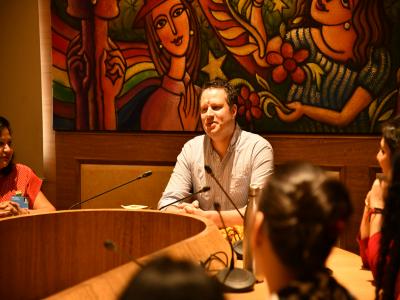Interactive session with Dr. Adam Michael Auerbach

Title of the event: Who Knows How to Govern? Procedural Knowledge in India’s Small-Town Councils: An Interactive session
Type of Event (Workshop/Seminar etc.): Interactive session
Date: Tuesday, 11 June 2024
Venue: Meeting room, IIS (Deemed to be University)
Name of Resource person (if any) with designation, address, email address & contact no. :
Dr. Adam Michael Auerbach
Johns Hopkins University, United States
aauerbach@jhu.edu
Mobile no- +1(609) 558-8387
No. of Participants/Beneficiaries (Teaching/Non-teaching/Students to be mentioned separately): BA(PC), BA& BE.D and BA (Hons.) Political Science and International Relations
Name of the activity Coordinator: Dr Archana Gupta
Name of Collaborating Agency (if any) with address & contact no.:
Objective of the workshop/seminar/activity: To orient the students about the procedural knowledge in local governance and the challenges faced by small-town councils in India, with a focus on Rajasthan.
Summary/Description (max 500 words):
On Tuesday, 11 June 2024, the Department of Political Science and International Relations organized an interactive session with Dr. Adam Michael Auerbach from Johns Hopkins University at A.V. Hall, IIS (Deemed to be University). The session aimed to enlighten students about the procedural knowledge and governance challenges faced by local politicians in India's small-town councils, specifically in Rajasthan.
Dr. Auerbach began the session with an introduction to his research paper titled "Who Knows How to Govern? Procedural Knowledge in India’s Small-Town Councils." His research highlights the significant difficulties faced by local politicians due to a lack of essential procedural knowledge, which impedes effective governance. The discussion underscored the importance of training programs to enhance the knowledge and skills of local representatives. Particular emphasis was placed on the need for training in council meeting procedures, spending rules, budget-making, and revenue powers. Dr. Auerbach also identified substantial barriers to knowledge acquisition, including high turnover, intersectional inequalities, and weak party organizations.
During the session, Dr. Auerbach provided a comparative analysis between Indian and US local governance systems. He noted that Indian cities exhibit a more deliberative participatory governance model, while US cities are more socially and politically active. This comparison led to a discussion on the reluctance of some Indian villages to be categorized as urban areas to retain benefits from schemes like MNREGA. The phenomenon of "Pradhan Pati," where women elected as Pradhan have their male relatives perform their official duties, was also a key topic of discussion. Participants examined the motivations behind contesting local elections, ranging from social mobility to a sense of superiority within society.
The interactive session saw active participation from students and faculty, who shared their insights on voting behavior in Indian villages. It was noted that candidates who are more connected and responsive to the people are generally preferred. Students also discussed the role of university elections in India as training grounds for future politicians. One notable example shared during the session was Tilonia, a self-sustained village, with the students insisting Dr. Auerbach to visit and observe its model of governance.
The session concluded with a focus on the importance of empowering local representatives through targeted training programs and institutional reforms to improve their governance capacity. Dr. Auerbach emphasized the need for ongoing efforts to support local officials in fulfilling their roles effectively. He pointed out that addressing the challenges of high turnover, intersectional inequalities, and weak party organizations is crucial for improving governance in small-town councils.
Overall, the interactive session provided valuable insights and stimulated thoughtful discussions among the participants. It contributed to a deeper understanding of the procedural knowledge challenges and opportunities in local governance. The event highlighted the critical need for continuous support and training for local representatives to ensure effective decentralized governance and enhance the democratic process at the grassroots level.
LIST OF PARTICIPANTS
|
Sno. |
Enrollment Number |
Name of the Student |
|
1. |
33637 |
Chhavi Saini (Ph.d) |
|
2. |
33019 |
Sumitra Kumari (Ph.D) |
|
3. |
36406 |
Deepika Gothwal (Ph.D) |
|
4. |
33561 |
Priyanka Shrivastava (Ph.D) |
|
5. |
35861 |
Avni Sharma (MA) |
|
6. |
233443 |
Ranu Kumari (MA) |
|
7. |
35612 |
Anjali Gupta (MA) |
|
8. |
32270 |
Yogita Sharama (BA. H) |
|
9. |
33130 |
Muskan Rathore (BA.H) |
|
10. |
35000 |
Anuja Pareek (BA.H) |
|
11. |
33938 |
Chahat Jain (BA.H) |
|
12. |
32394 |
Jahanvi Parashar (BA PC) |
|
13. |
32291 |
Jahanvi Khubani (BA PC) |
|
14. |
34381 |
Harshita Bhargava (BA PC) |
|
15. |
34453 |
Saloni Vijay (BA PC) |
|
16. |
32382 |
Shubhangini Rathore (BA. Bed) |
|
17. |
Ex- Student |
Neha Gwala |
|
18. |
Ex- Student |
Asma Khan |

